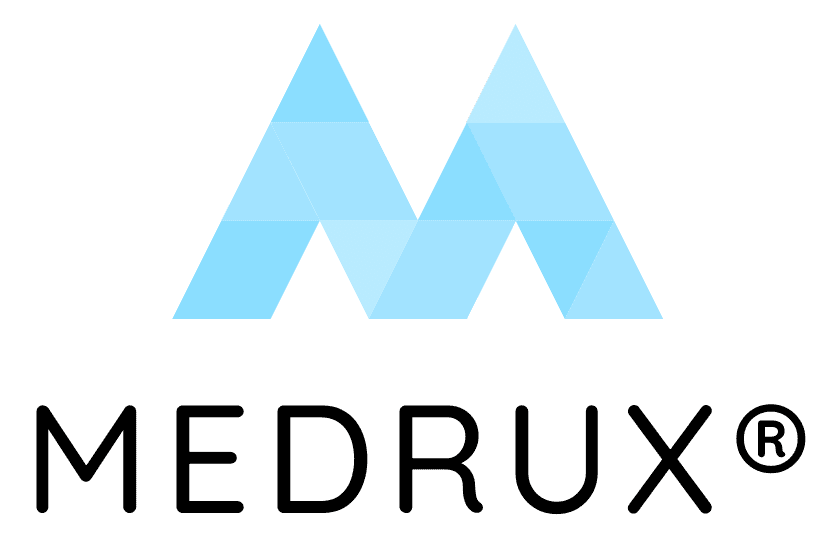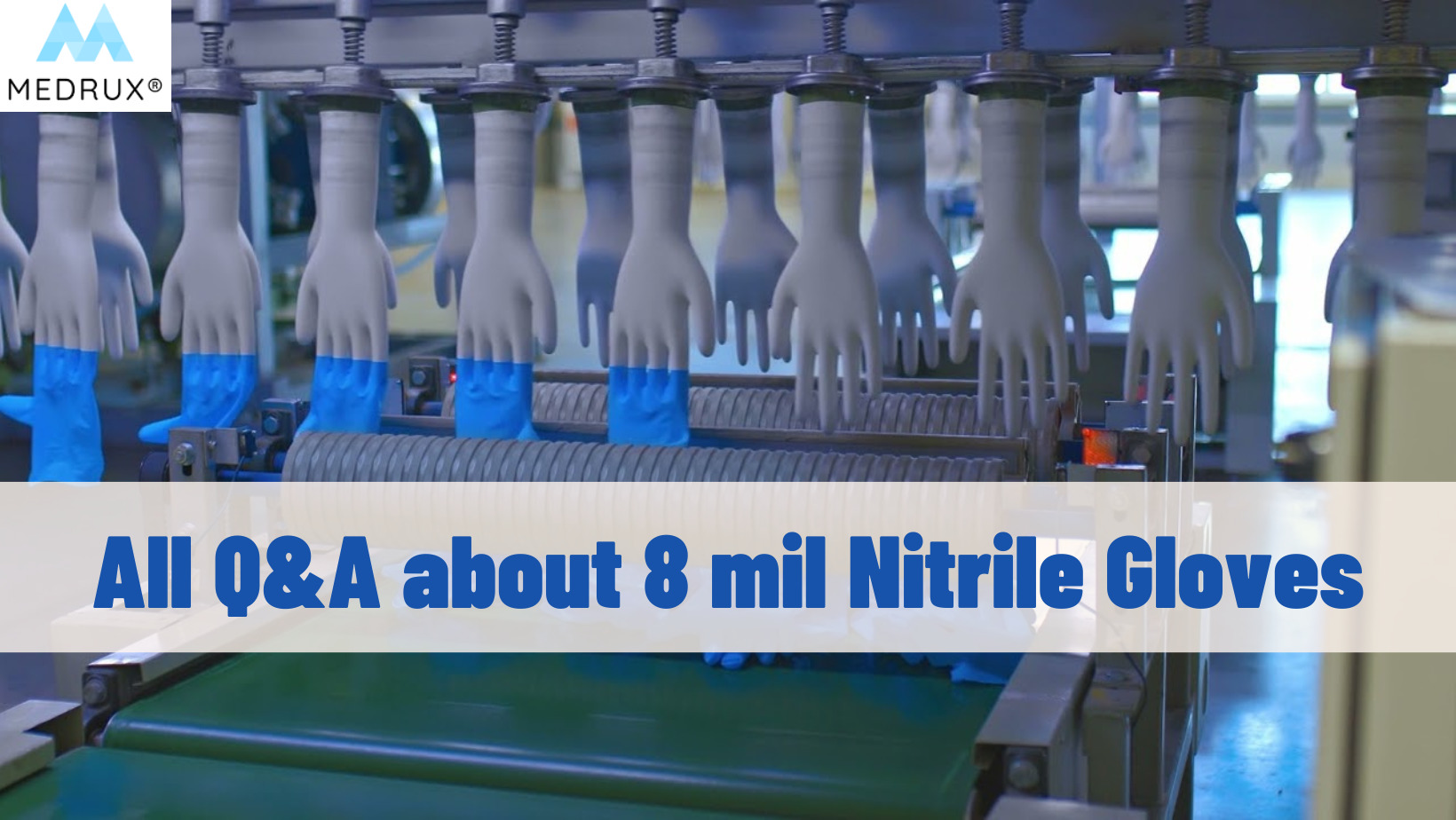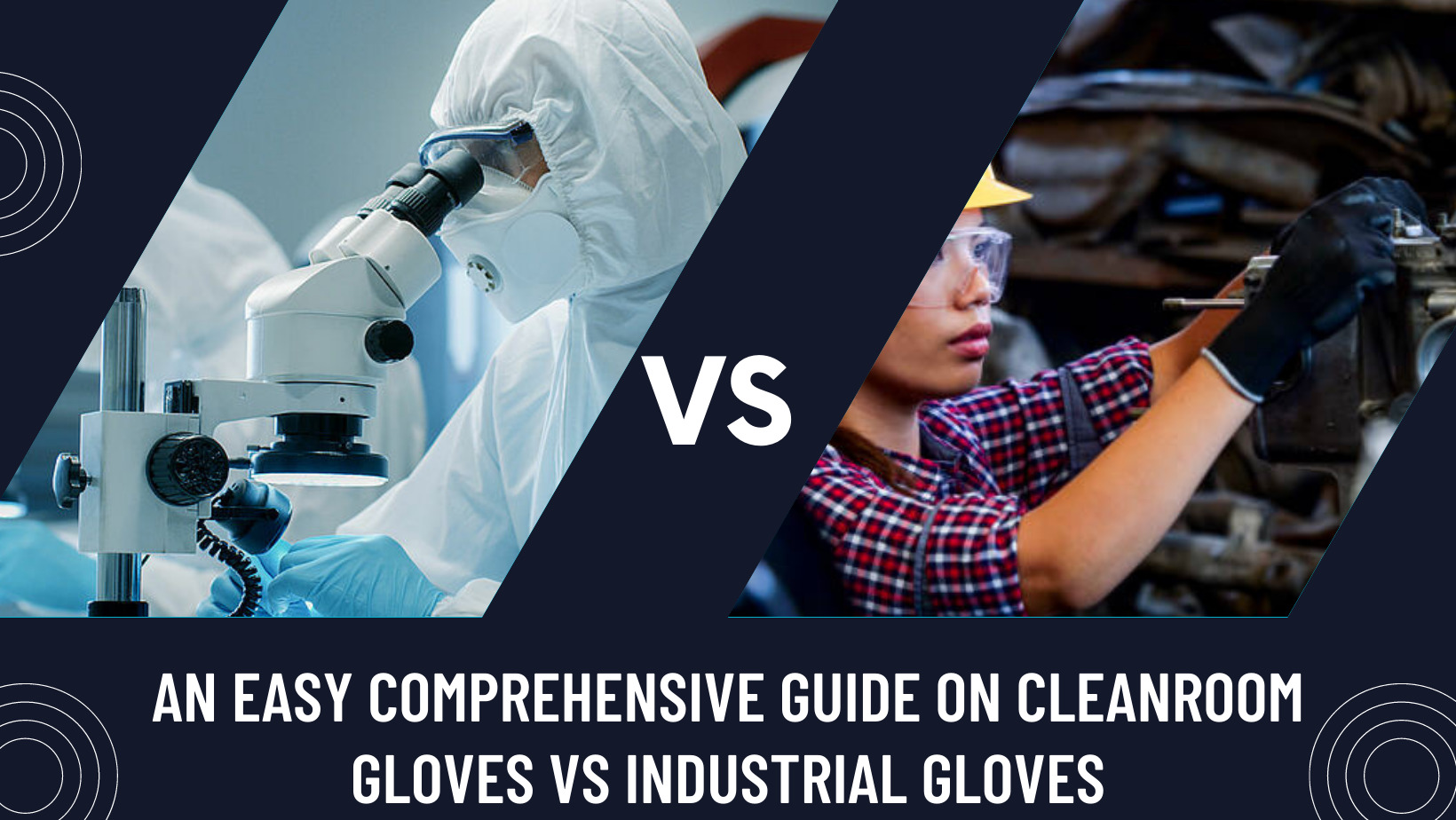To be honest, I’m not a big fan of the cooking process, and I’m not good at it either.
But when it comes to cleaning, oh, the joy it gives me!
Putting on a pair of cleaning gloves, some music, and here I have the best therapy I have ever discovered.
I don’t know why, but there’s joy in turning a dirty, unorganized place into a new, shiny one.
Whether it’s washing the dishes, cleaning the kitchen, cleaning around the house, or dusting and mopping the floors.
Honestly, it wasn’t always the case, but ever since I started using cleaning gloves, it’s like I discovered a new world.
Back then, I never used cleaning gloves to do anything; I just put my hands through hot water, soaps, detergents, and dirt, scrubbing, cleaning, and relying on a good handwash after.
I saw my mum, grandmother, and almost every single one of my family and friends do the same.
Nobody I knew used cleaning gloves!
Hence, it never occurred to me that I should.
So, what happened that made me so obsessed with them?
For once, I came across a few internet questions and answers that made me realize how bad this could be.
And now, I do want to apologize to my hands and skin for doing this, and I want to let everyone know why they should be using cleaning gloves!
Trust me, they’re a whole new level of protection and, at the same time, great help around the house.
In this article, we will go through the following:
- What are cleaning gloves, and who should use them?
- What types of cleaning gloves are there?
- 10 reasons why you should wear cleaning gloves
- What should you look for when buying cleaning gloves?
Let’s start…
What are cleaning gloves, and who should use them?
Cleaning gloves are known as household or domestic cleaning gloves.
Surprisingly, they are commonly known as “rubber gloves,” although not all are made from rubber.
Just as their name sounds, they are gloves you wear while cleaning your house.
You can use them while scrubbing your toilets, cleaning the oven, or even the refrigerator.
Additionally, they can be used to clean your shower, wash baseboards, clean outdoor furniture, mop the floor, wash the dishes, and treat your laundry stains.
Moreover, they are used in personal care activities such as dying your hair and first aid tasks.
They come in handy when cleaning the mess created by your pets, collecting their stools, or cleaning litter boxes.
In the medical and food industries, they can be used to clean surfaces such as tables, counters, and doorknobs.
Why?
It is to keep them clean and free of contamination and to maintain safe and hygienic infection control measures in these places.
Do you want to know more about uncommon uses?
Sometimes they’re even used as ice packs or heating packs, and I found that some people use them to open stubborn jars (such a magic trick).
Moreover, during COVID-19, people used them when handling plastic bags from grocery stores and while washing vegetables and fruits.
In short, cleaning gloves are indispensable in every house; without them, your cleaning kit is incomplete.
They’re also used by janitors, cleaners, maintenance workers, gardeners, housekeepers, restaurant workers cleaning dishes and washing vegetables and fruits, specialty cleaning companies, etc.
What types of cleaning gloves are there?
There are two types of cleaning gloves: disposable and reusable.
Disposable cleaning gloves are thinner than reusable ones.
They are best used for tasks that have a risk of cross-contamination.
I usually use them when handling very dirty tasks like cleaning my cat’s litter box or cleaning the shower drain.
So, it’s easier for me to just use them once and then throw them away.
In addition, disposable cleaning gloves are highly recommended in healthcare facilities because you’ll have to change them more frequently than usual.
They’re usually made of latex, nitrile, vinyl, or polyethylene.
Meanwhile, reusable cleaning gloves are thicker and more rigid, called industrial or heavy-duty gloves.
They’re most suitable for long-term use.
I’m kind of a clean freak, so I clean every two or three days (a habit from my mum), and, of course, dishes pile up by the end of the day, so I use clean gloves daily.
That’s why I prefer reusable ones, and if you’re the same, you should get a pair of reusable cleaning gloves.
But I keep a box of disposable cleaning gloves around for the stinky tasks.
They are made of rubber, latex, nitrile, silicon, microfiber, or a mix of cotton and textiles.
Additionally, they can be coated with latex, nitrile, or PVC for added properties.
Moreover, they protect against tears, cuts, and chemicals.
However, they can be less flexible.
They are washed and dried after each use. Nevertheless, if you notice any sign of damage, wear, tear, or contamination, you should discard them and replace them with a new pair.
So, what is the fuss about them? And why should you start using them?
Let me tell you about the top ten reasons why.
10 reasons why you should wear cleaning gloves
-
Hot water could your friend or worst enemy
Whether you’re washing the dishes, cleaning a dirty stove knob, or scrubbing grease off the floor, you know that hot water is the key to doing it quickly.
Hot water with some detergent can easily dissolve the grease, wash the dirt away and keep your plates and floors cleaner than ever.
Our skin is a delicate barrier full of natural oils, fats, and proteins that keep our hands healthy, soft, and moisturized.
So, can you imagine the same hot water dissolving grease, dissolving your natural oils, and sweeping them out of the skin? Ouch!
Spending so much time in hot water (even if you’re taking a bath) can disturb the balance of moisture and oils in your skin, causing your skin to be inflamed, itchy, red, and sometimes peeling.
In addition, sometimes you need boiling water to clean things properly and help kill the bacteria, and your skin can’t take much heat, so you are either turning the temperature of the water down and won’t get the results you need, or you will get severe burns from hot water.
Well, cleaning gloves have solved this dilemma for you!
They protect your hands from heat, and you can use even hotter water for better cleaning without worrying about it damaging your skin cells.
In short, hot water is not your friend, but cleaning gloves are!
-
Cleaning gloves protect you against chemical burns.
When cleaning around the house, you use products such as bleach and detergents.
These household cleaning products contain causative, corrosive, and dangerous materials such as ammonia, bleach, lye, hydrochloric acid, formaldehyde, hazardous acids, or petroleum distillates.
These materials can irritate or even burn your skin, so the corrosive logo they put on the label is there for a good reason.
Cleaning gloves are made with chemical-resistant materials
Therefore, anytime you use acidic cleaners such as bleach, you should always wear cleaning gloves to protect your skin from chemical burns.
-
Cleaning gloves keep your hands dry but not dry out.
Spending a lot of time working in cleaning jobs, whether your daily job or you’re cleaning around the house, your hands can be in frequent contact with water, soaps, and detergents.
Repeated and frequent contact can make your hands feel dry and cracked.
Dry and cracked skin is, for sure, not a good thing.
Why?
For one, the skin tries to compensate for the lack of moisture by producing excessive oils.
Two, it becomes susceptible to infection and quickly gets cuts and tears, and three, it’s annoying and painful!
It’s not because your skin is sensitive or anything. Frequent use can cause the skin to develop this dryness and itching and become a long-term condition such as eczema or contact dermatitis.
Or you could be allergic to any ingredient used in the chemicals and develop allergic reactions, including allergic contact dermatitis and rashes.
Furthermore, a dishpan hand is a condition of dryness, redness, and scaling of the hands that
result, typically from repeated exposure to, sensitivity to, or overuse of cleaning materials (such as detergents).
So, cleaning gloves protect your hands from contact dermatitis and other skin conditions like dishpan hands.
-
Cleaning gloves protect your nails and keep them looking good
It’s not just our hands and fingers damaged by water and detergents but our fingernails.
Why?
When exposed to water for a long time, your nails become frail, soft, and brittle and can easily tear and break.
My mum has complained that her fingernails are no longer growing well because she is always soaked in water and detergent while washing the dishes.
So, I gave her a pair of colorful cleaning gloves as a birthday gift.
Though she gave me a look of resentment, saying, “What are those for?” once I convinced her to try them on, she doesn’t wash the dishes or clean the house without them.
She says her fingernails are all growing again, and she’s happy about it. Thank you for the cleaning gloves.
Furthermore, if you’re a big fan of manicures and painting your nails in different colors, you’ll truly appreciate cleaning gloves.
They will ensure your painted nail stays longer, looks nice, and doesn’t chip from cleansers and water.
So, you can do your manicure without worrying about leaving your house dirty.
-
Cleaning gloves help you clean while keeping your hand’s cleaner
I bet you have been postponing a few cleaning tasks around the house because they look too dirty, and you might be disgusted at doing them.
The shower drains, cleaning the pet’s place, or scrubbing the toilet. They all sound disgusting, don’t they?
So, imagine doing them barehanded. Lord, have mercy on my fingernails!
Cleaning gloves keep your hands clean and give you a sense of being able to face whatever comes your way, no matter how dirty and yucky it may sound or look.
Furthermore, you will not be revolted or afraid of your hands getting dirty or things getting under your fingernails while cleaning things like burn bites, burned cheese in a pan, glued rise, grease and dirt sticking to your glass table, or worse, the sinkhole drain and chimneys.
If you don’t want to wash your reusable cleaning gloves, disposable cleaning gloves can come in handy. Finish the task and just throw them away.
Still, you’ll need to wash your hands afterward, just to be sure.
-
Cleaning gloves keep you and others from getting sick
In 2011, the National Sanitation Foundation (NSF) conducted a germ study to measure the levels of yeast, mold, and coliform bacteria, a family of bacteria including Salmonella and E. coli.
The study found that the dirtiest place around the house wasn’t the bathroom, as everyone believed.
Surprisingly, it was the kitchen, with the sponges and rags in the first place, followed by the kitchen sink and the stove knobs to the kitchen counter and cutting boards.
Why?
Because they provide the perfect wet conditions for these bacteria to thrive in.
On the other hand, the bathroom’s dirtiest places were surprisingly not the toilet, but the toothbrush holders (who cleans them, right?) and faucet handles (1)
These places are full of germs and bacteria that could cause you or your family members to get sick.
If you clean any of them with your bare hands while you have a tear or injury in your skin, who knows what kind of bacteria will enter your system and cause you illness?
In hospitals, workers wear gloves while cleaning floors, disk counters, and other places.
Why?
These places might have body fluid traces or droplets of sneezing from sick patients, so it’s better to be safe than sorry.
If you’re taking care of a sick member of the family or work as a home caregiver, you should protect yourself against the disease spreading around the house.
What’s more, if you’re sick and cleaning around, you could spread germs everywhere you touch, be it simple things such as the common cold virus or worse things like COVID-19.
That’s why it’s essential to wear cleaning gloves to minimize the spread of disease.
-
Cleaning gloves give you a good grip and dexterity
Some surfaces can be slippery, just like soapy water and slippery dishes.
One of the things that got me thinking before buying a pair of cleaning gloves was the fear that things would slip out of my hand and I would lose the dexterity I need to do tasks effectively and reach difficult places.
On the contrary, it was the total opposite.
Cleaning gloves give you a good grip on things, better than just holding them with bare hands.
Some are designed with extra features to help you grip things properly.
-
Cleaning gloves protect you against sharp objects
You will come into contact with sharp objects when you’re cleaning around the house, washing the dishes, or working in janitorial and maintenance work.
It could be a piece of broken glass, a sharp edge, or a needle blade while taking out the trash.
Cleaning gloves can help you avoid the pain of getting your hand cut or having small or even big tears.
Meanwhile, the grip will prevent dishes from slipping and breaking; if it happens, you will clean the pieces safely without having a bloody hand.
-
Cleaning gloves are easy to buy and use
Cleaning gloves are easy to put on and take off.
Most of them are lightweight and won’t bother you whatsoever.
You just put them on and do the job. If they’re disposable, you can just throw them away with no burden to carry.
And if they’re reusable, the cleaning process isn’t the hardest thing in the world; you just clean them and hang them there to dry, and they will eagerly wait for you for the next cleaning task.
What’s more, they are easily found everywhere, at the grocery store down the street, or you can buy them on Amazon and select your favorite one based on user reviews.
They are widely available and inexpensive to purchase.
-
Cleaning gloves come in different sizes and colors
Cleaning gloves come in different shapes and sizes.
For example, extra-long cleaning gloves stop water from running down onto your arms and keep your elbows and arms dry and protected.
When cleaning gloves are mentioned, their bright yellow color pops into your mind.
However, they have come in a variety of colors.
Why?
Cleaning gloves could cause cross-contamination, and you should never use the same gloves to do different tasks.
Instead, use different cleaning gloves while you do the dishes and another for the bathroom!
That’s why gloves are made in different shapes and colors, so you know what to use for each task.
This prevents cross-contamination.
Furthermore, they sometimes have cute shapes and patterns, so you can let your kids use them, pretend to have a superpower, and let them do the dishes for you for once.
To summarize,
cleaning gloves protect your hands and fingernails against hot water, chemicals, and household detergents.
Hence, keep your hands healthy and safe from skin inflammation, contact dermatitis, and eczema.
In addition to keeping them looking nice and clean no matter how dirty the task might be, they will keep your hands clean and dry while doing your cleaning tasks or janitorial cleaning work.
They will protect you against infections, cuts, and tears you may be exposed to.
Furthermore, they will give you the grip and confidence to tackle any problematic cleaning tasks.
They come in various sizes, shapes, and colors and are widely available almost everywhere.
And finally, they’re easy to use and clean.
So, whether you choose disposable or reusable cleaning gloves, there are a few things to look for when purchasing them.
Let’s go through them.
What should you look for when buying cleaning gloves?
It’s essential to know what exactly the things you will be cleaning are and what products you will use during the process.
Will you wash the dishes? Or deep clean your bathroom, or you’re just dusting around?
Besides the protection the gloves offer your hands, there are some features you should consider when deciding on buying a new pair of cleaning gloves.
-
Material
Latex gloves are the most comfortable, stretchy, and fit like a second skin.
Disposable gloves made of latex offer excellent protection against bloodborne pathogens, but they aren’t very resistant to chemicals.
Latex can be used as a coating for reusable cleaning gloves for waterproof purposes and good grip. However, it can’t be used for people with latex allergies.
Nitrile gloves have exceptional resistance to many chemicals, oils, fats, solvents, kerosene, and gasoline, but they don’t hold up well against strong acids or chemicals with nitrogen.
Furthermore, nitrile cleaning gloves offer high puncture and cut resistance, so you needn’t worry about using a sharp tool to clean or handle a broken glass of wine.
Vinyl gloves are the most economical and popular disposable cleaning gloves.
They have good chemical resistance, and some have anti-microbial properties. However, they are not as flexible as latex or nitrile.
Additionally, PVC is the environment’s worst enemy, so if you’re looking out for sea turtles, you may want to reconsider buying PVC gloves.
Neoprene gloves are probably the best for protection; they resist oils, acids, bases, alcohol, flames, and inks.
You can find them in varying thicknesses, and you can even get them lined for additional protection.
However, their thickness can inhibit their dexterity.
-
Comfort
Your gloves must be the right fit. You will be using them a lot. Trust me!
Cleaning gloves come in a variety of sizes and lengths to choose from.
Therefore, you should choose ones that fit snug or loose according to your tasks and preferences.
They shouldn’t be so large that they make you feel floppy and fumbling around, breaking things and unable to do the tasks effectively.
And, of course, not too tight that they bother you.
Some cleaning gloves have a moisture-wicking cotton liner and other soft materials.
Why?
For sweat absorption.
They’re called flock-lined cleaning gloves.
They’re made with padded cuffs that extend past the wrist, giving full coverage to wearers and maximum protection.
-
Waterproof
Your hands will be in contact with water and soap, too, so it’s a no-brainer that your cleaning gloves must be waterproof.
This helps you keep your hands dry and your house or workplace clean.
-
Dexterity and grip
I don’t think it would be great to drop dishes and break them, right?
Some gloves offer more dexterity than others.
Thicker gloves are less dexterous but suitable for yard work and scrubbing the bathtub or toilet.
Meanwhile, a lightweight cleaning glove allows you to move your hands around for tasks like cleaning the refrigerator or the corners of the house.
Always look for textured and embossed cleaning gloves with non-slip properties.
Why?
Because they offer a good grip on your cleaning tools.
Some silicone gloves have dense brush bristles on the palm side for added friction and efficiency.
If you are working with boiling water or deep frying on the stovetop, you will need gloves that will be heat resistant, such as PVC-coated cleaning gloves.
To protect your hands against high temperatures.
-
Chemical resistance
It’s essential to select chemical-resistant gloves if you’ll be working with things like oil, acid, alkali, or solvent.
Neoprene is your material if you’ll be working with powerful chemicals.
However, nitrile cleaning gloves offer excellent chemical resistance.
They are better than both latex and vinyl in chemical resistance.
For light, non-chemical cleaning like dusting, inexpensive vinyl or TPE gloves will do the job just fine.
If you have a latex allergy, it’s wise to stay clear of cleaning gloves made of latex.
Moreover, some powdered gloves cause allergic reactions and contact dermatitis.
Nitrile, neoprene, and vinyl are great alternatives to latex gloves as they’re latex free. Additionally, you can try a silicone alternative if you’re allergic or sensitive to rubber gloves.
In conclusion,
To select suitable cleaning gloves, you should first decide what tasks you will use them for. It will make your choices much more accessible and the cleaning process much more fun.
Cleaning gloves protect you against chemicals, tears, cuts, and abrasions.
They should be waterproof and, in some cases, heat resistant.
If you have a latex allergy, you should avoid using latex-made or coated gloves.
And finally, make sure they have a good grip on your cleaning tools.
We hope you enjoyed reading and have now changed your mind about why you should wear cleaning gloves.
If you still have more questions about them, feel free to send us, and we’ll happily answer your thoughts.







